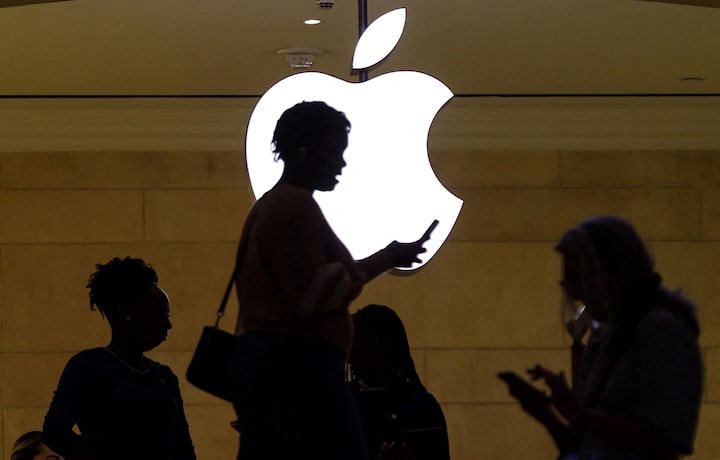A women uses an iPhone mobile device as she passes a lighted Apple logo at the Apple store at Grand Central Terminal in New York City, U.S., April 14, 2023. REUTERS
Summary
- The proposal coincided with Trump’s attack on DEI
- Apple says its oversight avoids legal risks
- Cook says the company’s success comes from a ‘culture of collaboration’
(Reuters) – Apple (AAPL.O), shareholders voted to keep the tech giant’s diversity, equity and inclusion policies on Tuesday, a win for management which had opposed efforts by a conservative group to scrap the program.
The vote at the iPhone maker’s annual meeting was seen as a test of shareholder views about the value of DEI programs, which many companies added or beefed up starting in 2020 amid the Black Lives Matter movement.
A growing conservative backlash has pushed major U.S. companies, including Meta (META.O) and Alphabet (GOOGL.O), to drop DEI initiatives ahead of and following Donald Trump’s return to the U.S. presidency.
Trump has criticized corporate DEI programs as discriminatory and suggested the U.S. Department of Justice could investigate whether such efforts violate the law.
The National Center for Public Policy Research, which describes itself as a free-market think-tank, had submitted the proposal titled “Request to Cease DEI Efforts” to the shareholder meeting. The proposal was defeated, with 210.45 million votes for it and 8.84 billion votes against it.
Proponents of the proposal argued that recent legal changes meant Apple would see an increase in discrimination cases if it continued DEI policies. Apple said it had an active oversight effort to avoid legal risks and that the proposal inappropriately restricted management.
While Apple discloses diversity data about its employee base, the company did not set targets or quotas. Many of its DEI efforts are in the form of programs such as a racial justice initiative under which it has provided support to historically Black colleges and universities in the U.S.
Apple also carries out DEI efforts outside of the U.S., such as support for teaching coding skills to indigenous populations in Mexico and working with an Aboriginal community-led nonprofit pursuing criminal justice reform in Australia.
Apple shareholders have in the past rejected proposals that would have required the company to disclose more about racial and gender pay gaps.
Apple CEO Tim Cook said at Tuesday’s meeting the company’s “strength has always come from hiring the very best people and then providing a culture of collaboration, one where people with diverse backgrounds and perspectives come together to innovate.”
But Cook added that “as the legal landscape around these issues evolves, we may need to make some changes to comply, but our North Star of dignity and respect for everyone and our work to that end will never waver.”
The same group had asked Costco Wholesale to report on the risks of maintaining its DEI initiatives. The membership-only retailer’s shareholders voted strongly against the proposal at a meeting in January.
On Monday, Apple highlighted its spending in the United States, saying it planned $500 billion in investments in the next four years, drawing praise from Trump days after media reported that Cook had met with the president.
Apple shareholders also voted against a proposal asking the company to prepare a report assessing the risks of its work with AI, though the proposal got the most votes of any shareholder effort. It received 1.04 billion “for” votes and 7.96 billion “against” votes.
All Apple management proposals, including a “say on pay” provision, were approved.
Cook said on Tuesday that Apple would be the biggest customer of a Taiwan Semiconductor Manufacturing Co (2330.TW), factory in Arizona that Trump helped bring to the United States during his first term.
Reporting by Aditya Soni in Bengaluru and Stephen Nellis in San Francisco; Editing by Shilpi Majumdar, Emelia Sithole-Matarise and Cynthia Osterman





